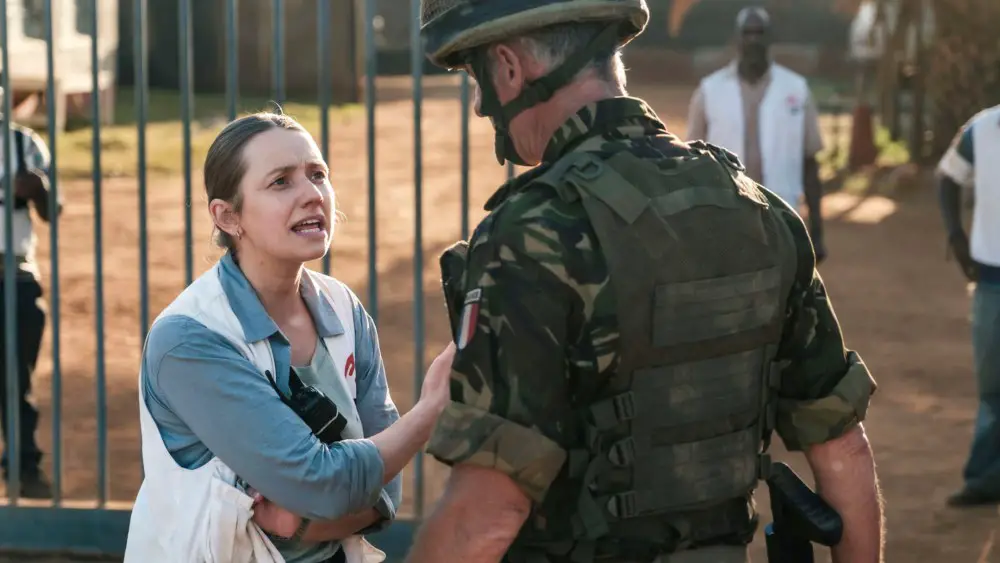Norwegian filmmaker Eirik Svensson’s new drama “Safe House” centers on an explosive conflict between a Muslim man and a Christian mob in a crisis-stricken African country. The film, which is being shown internationally by Trust Nordisk, was shown among works in progress at the Finnish Film Institute in Helsinki this week.
Safe House, written by prolific screenwriters Harald Rosenloh-Eeg and Lars Gudmestad, is based on the true story of Lindis Hulme, a Norwegian field worker for the aid organization Médecins Sans Frontières stationed in the central region. are. A civil war broke out in the African Republic in 2013.
The story unfolds on Christmas Eve in a field hospital outside a refugee camp in the capital, Bangui. As Hulme and his colleagues worked tirelessly to save lives, a desperate Muslim man rushed into the clinic, fleeing persecution by an angry Christian mob. As the crowd outside grows and Christian militia demand the man’s immediate execution, Hulme, played by Kristin Kujas Thorpe, realizes that his decision to save a life may put himself and the rest of his team in danger. We must recognize this and act promptly. .
“Safe House” is Svensson’s sixth feature film, and his previous films include “One Night in Oslo” and the Holocaust drama “Betrayal.” The film is produced by Katrin Gundersen and Ugo Hagerman Fosker of Norway’s Fantefilm (Arctic Convoy, The North Sea) and is scheduled for domestic release in early 2025 by Nordisk Film.
“Growing up, I thought that the world could and would only become a better and safer place every year, and that a peaceful world without hunger or disaster was possible.” Svensson said. variety. “Recently, I think many of us have been reminded that peace, feelings of common humanity, or the value of each of us as human beings, should not be taken for granted. , one of many stories that have gone untold or quickly forgotten around the world in recent years but deserve to be known.”
“Safe House” is based on Hulme’s autobiographical book “There’s No One Else – There’s Only Us”, which is based on her experiences as a relief worker in the face of humanitarian crises. These include the 2010 earthquake in Haiti, the civil war in the Central African Republic, the 2014-2016 Ebola outbreak in Liberia, and the refugee crisis in the Mediterranean.
Focusing on “a little-talked-about conflict in one of the world’s least-visited countries,” Svensson said she would like to highlight aid workers as a way for viewers to “authenticly connect with victims of conflict.” “I want to tell my story from the perspective of a local resident.” war. “
“This was a way to talk about what responsibility (and potential) each of us has to make a difference, or at least contribute to a different world and the lives of others.” he said. “Of course, this film isn’t just about informing and enlightening audiences; we hope it’s also a way to engage us all personally and emotionally. We also live in a world of paralyzing mass media images and news articles.
“My hope is that this film will be a vivid and realistic portrayal of the role and experiences of humanitarian workers,” he continued. “I think most of us don’t know or think about the fact that nine out of 10 aid workers in these situations are local people. It’s also a story about how people try to deal with the conflicts that tear them apart. ”
Thorpe, whose credits include director Nicolai Arcel’s 2023 Venice Golden Lion nominee The Promised Land, is an international cast that includes Bibi Tanga, Alexander Karim, Tracy Gotoas, Alma Poisti and Matthijs Herman Nyquist. He leads a cast of characters.
The film is co-produced by Film i Väst, Cinenic Film, ReelMedia and Nordisk Film.
